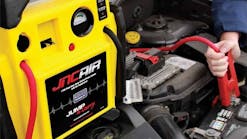Guest Blog: How Wi-Fi transfer can benefit your fleet
From operating school buses to driving garbage trucks, many companies that have vehicles are now using video recording systems on those vehicles to protect their drivers and their companies.
But with all of the videos produced by these systems, the process of downloading videos by manually removing physical storage can be a hassle. One method of video download that can provide many benefits is using Wi-Fi to wirelessly download videos.
But what benefits will you get out of using Wi-Fi to transfer your videos?
Let’s take a look at the main benefits.
Saves time
Imagine being a fleet manager for a public transit organization in a mid-sized city. Now imagine you have a fleet of 20 buses coming in and out of your garage at different times of the day.
If you have to manually pull out SD cards or hard drives to retrieve the video from the video recording systems on your buses, you could spend hours walking back and forth pulling that storage and returning it after downloading the video. And if you have multiple buses coming in and out throughout the day, you could be tied up all day as you wait to pull the video.
That’s time you could spend doing other things – like managing your fleet.
With Wi-Fi transfer, those files can be automatically uploaded to your servers or the cloud the minute your vehicles come back to the garage and connect to your Wi-Fi network. This undoubtedly can save you a great deal of time, and keep you focused on doing your job.
Another potential time-saving benefit of Wi-Fi transfer is some vendors provide the ability to make specific requests for videos and have those videos automatically download through Wi-Fi.
For example, you could make a request that you want all the video recorded on Bus No. 5 from 8 AM-5 PM from last Tuesday. The video recording system would automatically pull the video from that specific vehicle and period of time through the Wi-Fi transfer function. That saves a great deal of time when you’re looking for specific video footage from a specific vehicle.
Simplifies the video management process
Another benefit of using Wi-Fi transfer with your video recording systems is how it simplifies the video management process.
With Wi-Fi transfer, you can configure exactly how each type of video file is managed.
- Do you want to only download video when your vehicles come back to the garage?
- Do you want any sort of event video (accidents, incident video) to automatically get sent to you when they happen?
- Do you want to request video from only a few specific vehicles when they return to the garage?
Utilizing the Wi-Fi transfer capabilities of a video recording system can allow you to do all of those things, depending on the system.
For example, if you operate a towing business and you have video recording systems on your trucks, you could configure your systems to automatically download video of each tow completed that day when the trucks return and connect to your Wi-Fi. Instead of having to download video from the entire day and search through hours of video to find the footage that’s important to you, you can get the footage you need – exactly when you need it.
Limits potential for lost video
If you’re manually pulling out SD cards or hard drives to retrieve the video from the video recording systems on your vehicles, you could open up the potential for storage to get damaged and have files get corrupted if you’re constantly handling it.
If you’re pulling hard drives each day for a whole year, you could risk damaging the hard drive, especially if the hard drive is re-installed incorrectly. And if you live in an area where the elements are an issue, do you really want to expose your hard drives to rain and snow as you trudge back to your garage to download video?
You don’t want to find out at the moment when you need to pull video – especially if it’s involved in a legal investigation – that it’s gone because your hard drive is corrupted and the system isn’t working properly.
But by using Wi-Fi transfer, you can eliminate the opportunity for that storage to get damaged in the first place.
Information provided by Pro-Vision Video Systems


